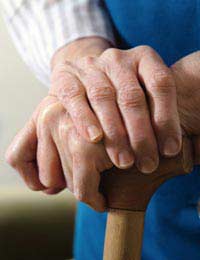Can Occupational Therapy Help?

Fibromyalgia syndrome causes a wide range of problems, both physical and emotional, including muscle pain, stiffness, and tiredness. Working with an occupational therapist can help with practical skills and support as well as coping skills and strategies.
What is Occupational Therapy?
Occupational therapy helps people with physical and psychiatric problems keep active and remain able to look after themselves (and their families) for longer, as well staying in work, enjoying leisure pursuits and taking part in their local communities. This includes teaching new ways of doing everyday tasks, providing equipment to make tasks easier, and supporting and teaching members of the family, caregivers and work colleagues about the illness. The occupational therapist may also recommend aids to help with walking, such as a frame, sticks or crutches (see ‘Choosing a Walking Aid’).As well as physical skills and practical solutions, occupational therapists can also help individuals with coping strategies, managing depression, stress and pain, relaxation techniques, and ways to improve sleep, which is a common issue in people with fibromyalgia syndrome. The key aim of occupational therapy in fibromyalgia syndrome is to improve functioning, maintain independence and reduce pain, as well as helping people balance periods of rest and activity.
The occupational therapist will begin the process with an assessment at home (and at work for people in employment). This will include watching the person with fibromyalgia syndrome carrying out a range of ordinary activities. It is important to ask plenty of questions and raise any issues of particular concern, such as sitting, walking, standing, climbing stairs, or lifting, so that the therapist can help as much as possible.
Occupational Therapy at Home
Occupational therapists will begin by assessing and evaluating the house and how well people cope with everyday tasks in and around the home, such as shopping, cooking and cleaning. They can help people with fibromyalgia syndrome work out how to simplify jobs and save energy as they work around the house.People with fibromyalgia syndrome can become quite isolated. Hobbies and social and leisure activities are therefore very important for people with fibromyalgia syndrome, and occupational therapists can suggest how to modify existing activities and interests, or even suggest new hobbies that would be just as interesting but might fit in better with patterns of illness.
Occupational Therapy at Work
An occupational therapist can help at work, by looking at the setup of desks, chair and computers, and advising on equipment that may help make jobs easier. An occupational therapist can also train people with fibromyalgia syndrome in how to sit, stand and lift objects. He or she may also recommend a temporary or permanent change in job, or reduction in hours, if this will help.Another part of the role of occupational therapist at work can be to teach employers and colleagues about fibromyalgia syndrome, including the limitations of people with the disorder, as well as their capabilities, which is just as important.
Occupational Therapists and Exercise
Exercise is very important in fibromyalgia syndrome, and occupational therapists can suggest stretches and exercises that help maintain some level of fitness, as well as improve muscle and joint pain and stiffness.- Choosing a Walking Aid
- Fibromyalgia and the Alexander Technique
- Dopamine Agonists in Fibromyalgia Syndrome
- Drugs in Development for Fibromyalgia Syndrome
- Anti-Seizure Medication in Fibromyalgia Syndrome
- Aromatherapy for Fibromyalgia Relief
- Neurofeedback for Fibromyalgia
- How Massage Therapy Can Help Fibromyalgia
- Using Biofeedback to Relieve Fibromyalgia
- Acupuncture and Acupressure for Fibromyalgia Relief
- Reflexology and Fibromyalgia Relief
- Seeing a Rheumatologist for Fibromyalgia Relief
- Cognitive Behaviour Therapy as an Aid
- Vitamins and Diet Supplements For Fibromyalgia Sufferers
- Hydrotherapy and its Applications for Fibromyalgia Sufferers
- How Fibromyalgia and Chronic Fatigue Syndrome are Medicated

Re: Numbness and Tingling in Fibromyalgia Syndrome
I'm having numb and tingling on my right side of face from corner of mouth to high cheek bone...........…
Re: Benefits and Allowances for Fibromyalgia Sufferers
I have fibromyalgia I started with it at the age of 5 years old I got burnt by a chip at pat the age…
Re: Benefits and Allowances for Fibromyalgia Sufferers
Having read all the comments here. I’m very discouraged. I don’t think I’ll be putting myself through…
Re: Chronic Fatigue and Fibromyalgia
I have not been diagnosed with fibromyalgia as such. The doc thinks it is, I have been put on antidepressants. To quote him ,…
Re: Reading Aids and Fibromyalgia Syndrome
Eeeeer.
Re: Being a Parent With Fibromyalgia
I'm really struggling I have my 2 grandsons full-time or thy would of ended up in the system been 18 month now thy are now 2…
Re: Dealing With Fatigue Day by Day
Hi I've had FM for years now, I've always worked but now ive gotten so bad with pain increasing and being on max dose, i work…
Re: Benefits and Allowances for Fibromyalgia Sufferers
Over 20 years ago after mri blood test I was told I had fibromyalgia, I was working at the time until…
Re: Benefits and Allowances for Fibromyalgia Sufferers
I work part time and am a carer in receipt of carer's allowance for my hubby who is on state pension.…
Re: Fibromyalgia in Old Age
I don't know if I have fibromyalgia but 3 months ago I had a migraine which led to chronic neck ache. Now I have pain in various parts of…